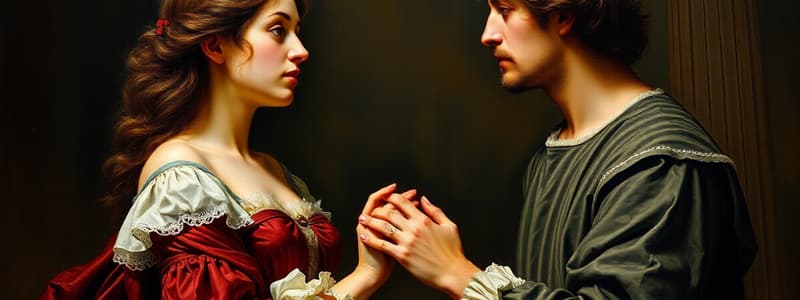Podcast
Questions and Answers
How does the character of Mercutio primarily serve the plot and Romeo's development?
How does the character of Mercutio primarily serve the plot and Romeo's development?
- By acting as a foil to Romeo's romantic idealism, Mercutio provides a contrasting perspective on love and highlights Romeo's immaturity. (correct)
- By instigating conflicts with the Capulets, allowing Romeo to demonstrate his loyalty to the Montague family.
- By offering consistent, unwavering support for Romeo's decisions, preventing him from making rash choices.
- By serving as a messenger between Romeo and Juliet, ensuring their plans are executed flawlessly.
Consider the motivations of Friar Lawrence; which statement best explains his rationale for marrying Romeo and Juliet?
Consider the motivations of Friar Lawrence; which statement best explains his rationale for marrying Romeo and Juliet?
- He believes their love is divinely ordained and fears opposing it.
- He hopes that the marriage will reconcile the feuding families and restore peace to Verona. (correct)
- He seeks to elevate his own status within the church by successfully mediating the family conflict.
- He is swayed by Romeo's persistent pleas and Juliet's threat of suicide.
In what way does Tybalt's character contribute to the play's tragic trajectory?
In what way does Tybalt's character contribute to the play's tragic trajectory?
- His indifference to the feud enables Romeo and Juliet to find solace and support within the Capulet household.
- His peaceful disposition allows Romeo and Juliet's love to blossom without familial interference.
- His hatred of Montagues incites conflict, escalating the feud and leading to violent confrontations and ultimately Romeo's banishment. (correct)
- His willingness to negotiate peace between the families sets an example of reconciliation and understanding.
Considering the historical context of arranged marriages, how does Juliet's situation reflect societal expectations of women during the Renaissance?
Considering the historical context of arranged marriages, how does Juliet's situation reflect societal expectations of women during the Renaissance?
How does the prologue's description of Romeo and Juliet as "star-cross'd lovers" influence the audience's perception of the play's events?
How does the prologue's description of Romeo and Juliet as "star-cross'd lovers" influence the audience's perception of the play's events?
How does the concept of 'hubris' manifest in the actions and decisions of Lord Capulet?
How does the concept of 'hubris' manifest in the actions and decisions of Lord Capulet?
What role does Benvolio play in the unfolding of the tragedy?
What role does Benvolio play in the unfolding of the tragedy?
How does the nurse contribute to both the development of Juliet's character and the overall tragedy?
How does the nurse contribute to both the development of Juliet's character and the overall tragedy?
How does the setting of Verona during the Renaissance period contribute to the themes explored in Romeo and Juliet?
How does the setting of Verona during the Renaissance period contribute to the themes explored in Romeo and Juliet?
Which of the following best exemplifies 'peripeteia' in Romeo and Juliet?
Which of the following best exemplifies 'peripeteia' in Romeo and Juliet?
How does Lady Capulet's character contribute to Juliet's tragic fate?
How does Lady Capulet's character contribute to Juliet's tragic fate?
What role does Prince Escalus play in the context of the Montague-Capulet feud?
What role does Prince Escalus play in the context of the Montague-Capulet feud?
Which of the following decisions made by Romeo can be considered a manifestation of his 'hamartia' or tragic flaw?
Which of the following decisions made by Romeo can be considered a manifestation of his 'hamartia' or tragic flaw?
How does Shakespeare use language in Romeo and Juliet to reflect the conventions of Elizabethan drama?
How does Shakespeare use language in Romeo and Juliet to reflect the conventions of Elizabethan drama?
What is the significance of the moment when the Montagues and Capulets finally recognize the consequences of their hatred after Romeo and Juliet's deaths?
What is the significance of the moment when the Montagues and Capulets finally recognize the consequences of their hatred after Romeo and Juliet's deaths?
Flashcards
Romeo Montague
Romeo Montague
The son and heir of Lord and Lady Montague; handsome, intelligent, and sensitive.
Juliet Capulet
Juliet Capulet
The daughter of Lord and Lady Capulet; initially naive, but grows courageous and devoted upon falling in love.
Friar Lawrence
Friar Lawrence
A Franciscan friar, Romeo’s confidant, and friend to both lovers; secretly marries Romeo and Juliet hoping for peace in Verona.
The Nurse
The Nurse
Signup and view all the flashcards
Mercutio
Mercutio
Signup and view all the flashcards
Tybalt
Tybalt
Signup and view all the flashcards
Hamartia (Tragic Flaw)
Hamartia (Tragic Flaw)
Signup and view all the flashcards
Hubris
Hubris
Signup and view all the flashcards
Peripeteia
Peripeteia
Signup and view all the flashcards
Anagnorisis
Anagnorisis
Signup and view all the flashcards
Evokes Pity and Fear
Evokes Pity and Fear
Signup and view all the flashcards
Catharsis
Catharsis
Signup and view all the flashcards
Role of Fate
Role of Fate
Signup and view all the flashcards
Role of Free Will
Role of Free Will
Signup and view all the flashcards
Historical Context
Historical Context
Signup and view all the flashcards
Study Notes
- Romeo and Juliet is a tragedy by William Shakespeare thought to have been written between 1591 and 1595.
- The play tells the story of two young star-crossed lovers from feuding families who eventually die by suicide.
Main Characters
- Romeo Montague: The son and heir of Lord and Lady Montague.
- Romeo is handsome, intelligent, and sensitive.
- Initially he is lovesick over Rosaline, but his love quickly turns to Juliet.
- He is impulsive and immature.
- Juliet Capulet: The daughter of Lord and Lady Capulet.
- Juliet begins as a naive child who has thought little about love and marriage, but she grows up quickly upon falling in love with Romeo.
- She shows amazing courage and devotion.
- Friar Lawrence: A Franciscan friar, and Romeo’s confidant.
- He is a friend to both Romeo and Juliet.
- He secretly marries them in hopes that the union will bring peace to Verona.
- He is a Catholic holy man, and well-respected.
- The Nurse: Juliet’s nurse, and a major character in the play.
- She is Juliet’s confidante and source of comic relief.
- She provides a contrast to Juliet’s serious and passionate nature.
- Mercutio: A kinsman to the Prince and Romeo’s close friend.
- He is witty, imaginative, and hot-headed.
- He finds Romeo’s romanticized views of love tiresome.
- Tybalt: Juliet’s cousin on her mother’s side.
- He is vain, fashionable, supremely aware of courtesy and is known as “the prince of cats”.
- He hates Montagues.
- Lord Capulet: The patriarch of the Capulet family, father of Juliet, husband to Lady Capulet.
- He commands respect and propriety.
- Lady Capulet: Juliet’s mother, wife to Lord Capulet.
- She is eager to see her daughter marry Paris.
- Lord Montague: The patriarch of the Montague family, father of Romeo, husband to Lady Montague.
- Lady Montague: Romeo’s mother, wife to Lord Montague.
- Paris: A kinsman of the Prince and suitor of Juliet.
- He is handsome, wealthy, and wants to marry Juliet.
- Benvolio: Romeo’s cousin and thoughtful friend.
- Prince Escalus: The Prince of Verona.
- He is concerned about maintaining the public peace.
Tragedy Elements
- Romeo and Juliet exemplifies the genre of tragedy through several key elements.
- The play’s exploration of fate, love, and death leads to a devastating conclusion.
- Hamartia or Tragic flaw is evident in Romeo and Juliet’s impulsive nature and rash decisions, contributing to their downfall.
- Romeo’s quickness to fall in love leads to his and Juliet's secret marriage.
- Juliet’s obedience to her father's demands for marriage to Paris leads to the desperate plan involving the potion.
- Hubris, or excessive pride, is seen in the characters' unwavering loyalty to their families, perpetuating the feud.
- The Capulets and Montagues emphasize family honor over individual happiness, leading to tragic consequences.
- Peripeteia, or reversal of fortune, occurs when Romeo is exiled from Verona after killing Tybalt.
- This event marks a turning point in the play, setting in motion a series of unfortunate events.
- Anagnorisis, or recognition, is evident when the Montagues and Capulets realize the consequences of their hatred after Romeo and Juliet's deaths.
- They acknowledge the tragic outcome of their long-standing feud.
- The play evokes pity and fear in the audience as they witness the tragic events unfold.
- The deaths of Romeo and Juliet elicit strong emotional responses.
- Catharsis, or purification, occurs as the audience experiences a sense of emotional release and understanding.
- The play's tragic conclusion serves as a cautionary tale about the destructive consequences of hatred, prejudice, and irrationality.
- Fate vs Free Will: The characters often attribute events to fate.
- The prologue calls Romeo and Juliet “star-cross’d lovers”.
- Fate is a powerful force that influences the tragic events of the play.
- The characters also make choices that contribute to the tragic outcome.
- Romeo decides to gatecrash the Capulet party.
- Juliet decides to send the Nurse to Romeo.
Historical Context
- Romeo and Juliet is set in Verona, Italy, during the Renaissance period.
- The Renaissance was a time of great cultural and artistic flourishing.
- It was also a time of political and social upheaval.
- Shakespeare drew inspiration from the social and political climate of his time when writing Romeo and Juliet.
- The theme of family feuds reflects the reality of Italian city-states during the Renaissance.
- The conflict between the Montagues and Capulets mirrors the rivalries between powerful families in Italian society.
- The play also reflects the patriarchal nature of Renaissance society, where women had limited autonomy.
- Juliet's arranged marriage to Paris is indicative of the societal expectations placed on women.
- Shakespeare’s exploration of love and passion challenged traditional notions of courtly love.
- The play celebrates the intensity and transformative power of romantic love.
- Shakespeare’s use of language reflects the conventions of Elizabethan drama.
- He uses blank verse, iambic pentameter, and rhetorical devices to create dramatic and poetic effects.
Studying That Suits You
Use AI to generate personalized quizzes and flashcards to suit your learning preferences.




